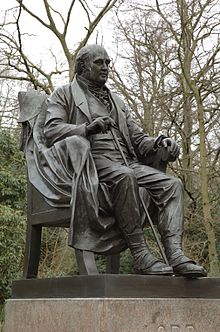Henry Vassall-Fox, 3rd Baron Holland
Henry Richard Vassall-Fox, 3rd Baron Holland , PC (born November 21, 1773 at Winterslow House in Wiltshire , † October 22, 1840 in London ) was a British statesman and politician of the Whig Party.
Vassall-Fox was the nephew of the famous politician Charles James Fox . Fox first attended Eton College , studied in Oxford at Christ Church College and then went on long trips. In Italy he met Sir Godfrey Webster's wife, Elisabeth Vassall, who left her husband for him. Their first son was born in 1796. Fox married her the following year and took the family name Vassall-Fox. The couple had three other children.
At the age of one year, after his father's death, Vassall-Fox inherited the two baronies that had originally been given to his paternal grandparents. After his return in 1797 he entered the House of Lords , in which he joined the Liberal Party like his uncle . He was their most exposed representative in the House of Lords and in this capacity fought William Pitt's warlike policy against France, spoke against the increase in taxes, against the suspension of the Habeas Corpus Act , against the union with Ireland , urged a reform of the parliamentary electoral law etc. .
After the Peace of Amiens in 1802 he went to Spain because of his poor health. As a result of his studies, the biographies of Guillem de Castro and Lope de Vega (London 1805; 2nd ed. 1817, 2 vol.) And the translation of three Spanish comedies (London 1807) appeared.
After returning to Great Britain, he took his seat in the House of Lords again in 1805 and supported the motion, again as one of the leaders of the opposition, to initiate an impeachment procedure against Minister Viscount Melville on suspicion of wasting public money . After Pitt's death (1806), he joined the government of all talents formed by William Wyndham Grenville and Charles James Fox as Lord Seal Keeper , which was dissolved soon after Fox's death. In 1808 he spoke for the emancipation of Catholics , supported the Spanish struggle for freedom and also advocated the principles of the liberal party in other ways, especially on the question of slavery.
In 1814 and 1815 he traveled the continent and in February 1815 had a meeting with Joachim Murat in Naples , about which he reported in A letter to a Neapolitan nobleman . In the years 1816-1818 Vassall-Fox repeatedly endorsed the complaints that the friends of the Emperor Napoleon raised about his treatment in St. Helena.
In 1828 he supported the emancipation of the Catholics and entered the cabinet in November 1830 under Gray as Chancellor of the Duchy of Lancaster ; in the same capacity he was also a member of the Melbourne government .
With Clarendon he represented friendly relations with France on the oriental question. His house was a gathering place for artists and scholars. He died in London on October 22, 1840.
He wrote a biography of his uncle Fox, which he published with his work History of the early part of the reign of King James II (London 1808); He also edited The memoirs and speeches of James, 2nd Earl Waldegrave, 1742 - 1763 (1822, 2 vol .; Cambridge Univ. Pr., 1988, ISBN 0-521-36111-7 ).
The Opinions of Lord Holland in the house of Lords (1841) were later published about his parliamentary activities .
His son Henry Edward Fox, 4th Baron Holland, published his father's travel memories ( Foreign reminiscences , 1850) and his memoirs of the Whig party during my time (1852-1854, 2 vol.).
| predecessor | Office | successor |
|---|---|---|
| Henry Addington |
Lord seal keeper 1806-1807 |
John Fane |
| Stephen Fox |
Baron Holland 1774-1840 |
Henry Edward Fox |
| personal data | |
|---|---|
| SURNAME | Vassall-Fox, Henry 3rd Baron Holland |
| ALTERNATIVE NAMES | Vassall-Fox, Henry Richard; Vassall-Fox, Henry Richard 3rd Baron Holland |
| BRIEF DESCRIPTION | British statesman |
| DATE OF BIRTH | November 21, 1773 |
| PLACE OF BIRTH | Winterslow House, Wiltshire |
| DATE OF DEATH | October 22, 1840 |
| Place of death | London |
